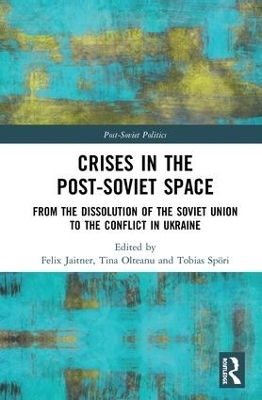
Crises in the Post‐Soviet Space
Routledge (Verlag)
978-0-8153-7724-5 (ISBN)
The breakup of the Soviet Union led to the creation of new states and territorial conflicts of different levels of intensity. Scrutinising the post‐Soviet period, this volume offers explanations for both the frequency and the intensity of crises in the region.
This book argues that the societies which emerged in the post-Soviet space share characteristic features, and that the instability and conflict-prone nature of the Soviet Union’s successor states can be explained by analysing the post-independence history of the region and linking it to the emergence of overlapping economic, political and violent crises (called 'Intersecting Crises Phenomena’). Transformation itself is shown to be a decisive process and, while acknowledging specific national and regional characteristics and differences, the authors demonstrate its shared impact. This comparison across countries and over time presents patterns of crisis and crisis management common to all the successor states. It disentangles the process, highlighting the multifaceted features of post-Soviet crises and draws upon the concept of crisis to determine the tipping points of post-Soviet development.
Especially useful for scholars and students dealing with the Soviet successor states, this book should also prove interesting to those researching in the fields of communist and post‐communist Studies, Eurasian politics, international relations and peace and conflict studies.
Tina Olteanu is a Professor of Political Science at the Department for Political Science at the University of Vienna, Austria. Her research interests are democracy and democratization, participation and corruption research mainly in Eastern Europe but also in a European comparative perspective. Felix Jaitner is a doctoral student at the Department of Political Science, University of Vienna. His research is focused on uneven and peripheral development, the transformation process in Eastern Europe and the post-Soviet space and state theory. Tobias Spöri is a PhD candidate at the Department of Political Science, University of Vienna. His research deals with political participation, the legacy of state socialism and the transformation of post-socialist Europe since 1989/1991.
1 Introduction: Crises in the Post-Soviet Space – From the Dissolution of the Soviet Union to an Area of ‘Intersecting Crises Phenomena’? PART I Mapping post-Soviet Crises 2 The dissolution of the Soviet Union and its consequences 3 Divergent Social and Economic Consequences of Transformation in Post-communist States 4 Divergent Political-Economic Trajectories: Russia, Ukraine, Belarus PART II Crises of Belongings 5 Creating the History of the Future: Russian Historical Memory in the Era of the Ukrainian Crisis 6 Ukraine: The Dynamics of Cross-Cutting Cleavages During Quadruple Transition 7 Ethnic Divides in the Baltic States: Political Orientations after the Russian–Ukrainian Crisis 8 'Stability's End: The Political Economy of Russia's Intersecting Crises Since 2009 9 The making of Ukraine’s multilevel crisis: transnational capitalism, neoliberal kleptocrats, and dispossession 10 Ukraine’s Frozen Transformation. State Capture, Nationalising Policies and Shifting Geopolitics 11 "Decline of the Demos: Latvia, the Face of New Europe and Austerity’s Return" PART IV Crises of Political Power 12 Chechnya: A Study of a Post-Soviet Conflict 13 Azerbaijan between Post-Socialist Crisis and Fragile Stability 14 Kazakhstan’s political and economic development and the role of the ruling elites Conclusion: The Ukraine conflict as a result of post-Soviet crises development
| Erscheinungsdatum | 21.08.2018 |
|---|---|
| Reihe/Serie | Post-Soviet Politics |
| Zusatzinfo | 9 Tables, black and white; 14 Line drawings, black and white; 15 Illustrations, black and white |
| Verlagsort | New York |
| Sprache | englisch |
| Maße | 156 x 234 mm |
| Gewicht | 544 g |
| Themenwelt | Naturwissenschaften ► Geowissenschaften ► Geografie / Kartografie |
| Sozialwissenschaften ► Politik / Verwaltung ► Allgemeines / Lexika | |
| Sozialwissenschaften ► Politik / Verwaltung ► Europäische / Internationale Politik | |
| ISBN-10 | 0-8153-7724-X / 081537724X |
| ISBN-13 | 978-0-8153-7724-5 / 9780815377245 |
| Zustand | Neuware |
| Informationen gemäß Produktsicherheitsverordnung (GPSR) | |
| Haben Sie eine Frage zum Produkt? |
aus dem Bereich


